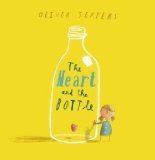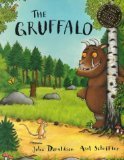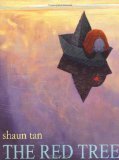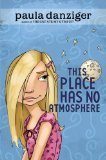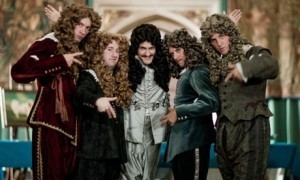Claire Hennessy's Blog, page 35
December 15, 2011
Attempting to yap about picture books
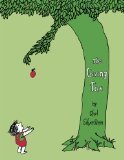
 I've been trying to think of ways to talk about picture books.
I've been trying to think of ways to talk about picture books.
But picture books are hard to talk about. They have pictures that do so much of the work – images that invite you into the land of the visual and leave you somewhat unable to explain them and their appeal with just words.
(I did think about pictures, but I cannot draw. I draw stick figures and small children laugh at them. I'll stick to the words.)
It might be just me. Other people seem to find it manageable to talk expertly about the picture-y bits.
Anyway.
I was sick recently, with that winterish blaaaaargh thing that kicks in around this time of year. So I went reading and rereading picture books, which were less intimidating than big blocks of text.
And then it occurred to me that I rarely do picture-book yap here, so here's… some making up for that.
One of my all-time favourites is The Gruffalo (Julia Donaldson and Axel Scheffler). A little mouse goes walking in the woods, facing scary creatures. Lovely rhymes, and a delightful ending. Room on the Broom, by the same pair, is also terrific.
Michael Rosen's Sad Book (Michael Rosen) has those fabulous scratchy Quentin Blake illustrations and is about being sad – it starts off being about the specific grief of losing someone (in Rosen's case, his son) but expands into sadness more generally. Very moving, gets you right in the gut.
Shaun Tan's The Red Tree is gorgeous. The text is very straightforward; the images take it all to a completely different, vivid, slightly mad level. (This is also the sort of book that rewards careful rereading and re-looking.)
The Sesame Street book The Monster at the End of This Book is just delightful.
Crockett Johnson's Harold and the Purple Crayon is a classic and very very sweet – Harold draws a road with his purple crayon and goes on a variety of adventures.
Shel Silverstein's The Giving Tree is one I like but am not sure I love – I find it very sad, more so than inspirational.
Marie-Louise Fitzpatrick's There is very, very pretty and lovely. What is 'there' like and how will you know it?
And on a related note – Dr Seuss's Oh, the Places You'll Go! is a long-time favourite of mine. Very charming rhymes, wise advice, and a dash of lunacy.
Oliver Jeffers's The Heart and the Bottle is probably the picture book I have recommended most to people who don't 'do' picture books. It will almost certainly make you cry. Stuck, however, will make you laugh. A lot. And The Incredible Book-Eating Boy is very very pretty.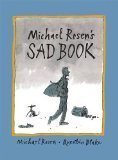

Carol Ann Duffy's The Lost Happy Endings is gorgeous – good for slightly older picture-book readers (the language is a bit more complex than many of the others mentioned here) and for anyone who likes fairytales and storytelling. My favourite illustration is the one where the sack of happy endings is shook out into the air, with golden happily-ever-after sentences dancing down the page. So pretty!
December 4, 2011
Things on the internets
–> Breaking Dawn drinking game.
–> Really interesting piece about Nora Roberts, her writing, and romance fiction. I have not read a huge amount of Nora Roberts, but I like what I have read, and I really like her approach to writing – so disciplined.
"…women aren't supposed to have expectations, right? We're pretty smart. I think we know the difference between reality and fiction."
–> A nifty post on the benefits of writing part-time.
–> YA author Beth Revis talks about writing bravely.
–> Sarah Webb writes about the move towards publishers focusing only on bestsellers and the problems with this. Very much worth reading.
November 27, 2011
Book-post!
Aha, yes, it has been a while, hasn't it? Thoughts on recently-read books, some more detailed than others.
Stephanie Perkins – Anna and the French Kiss
This debut from Stephanie Perkins is adorable, and funny, and sweet, and painful, and deeply deeply romantic. 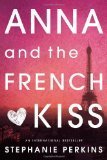
 Anna is spending her senior year of high school at an American boarding school in Paris (Paris!) but despite appreciating that it's, you know, Paris, she's also nervous about being in a new city alone, without speaking the language, and wishes she'd been given a choice. Very quickly, though, she makes friends, including the delicious Etienne (actually British, despite the French name), who she very quickly falls for. Trouble is, he has a girlfriend. The will-they-won't-they plot is handled beautifully, woven in throughout Anna's other friendships and relationships (both in Paris and back home in Atlanta) and her exploration of Paris. I loved that Etienne was a history nerd (not the exact phrasing used in the book, but, oh, gosh, he so is, and it's delightful), and afraid of heights, and so very much not perfect. Theirs is a very messy but very authentic and sweet story, and one that's definitely worth reading. (Plus. Boarding school. In Paris. These things make me happy.)
Anna is spending her senior year of high school at an American boarding school in Paris (Paris!) but despite appreciating that it's, you know, Paris, she's also nervous about being in a new city alone, without speaking the language, and wishes she'd been given a choice. Very quickly, though, she makes friends, including the delicious Etienne (actually British, despite the French name), who she very quickly falls for. Trouble is, he has a girlfriend. The will-they-won't-they plot is handled beautifully, woven in throughout Anna's other friendships and relationships (both in Paris and back home in Atlanta) and her exploration of Paris. I loved that Etienne was a history nerd (not the exact phrasing used in the book, but, oh, gosh, he so is, and it's delightful), and afraid of heights, and so very much not perfect. Theirs is a very messy but very authentic and sweet story, and one that's definitely worth reading. (Plus. Boarding school. In Paris. These things make me happy.)
(Also – there is a bonus scene on the author's website in which Star Trek is discussed. Oh my.)
David Levithan & Rachel Cohn – Dash and Lily's Book of Dares
Another collaboration between Levithan and Cohn, a he-said she-said romance which travels around New York and mentions The Strand bookstore an awful lot. I loved reading this – it's full of the usual quirky, insightful teen characters that you'd expect from these two, but it also let me live vicariously through them and do Christmas-in-New-York. Worth reading.
Melissa Hill – Something From Tiffany's
This was another book with a Christmas-in-New-York part, strangely enough, though it concentrates on the less bookish corners. After an accident, two Tiffany's boxes get mixed up, and widower Ethan, who'd been planning to propose to his new girlfriend, instead finds a charm bracelet. Meanwhile, restaurant co-owner Rachel can't stop herself from peeking in her boyfriend Gary's Christmas shopping – and when she finds a ring she's absolutely delighted. The mix-up scenario, and the fall-out from it, is made plausible, and there are a few extra twists and turns along the way. Highly enjoyable.
Melvin Burgess – Kill All Enemies
To be honest, every time I'd heard about this book it had been linked with the London riots, so my impression of it before reading was that it was some kind of dystopian nightmare. It isn't – it's the story of three teenagers in PRUs (pupil referral units) in England, the acting-out types who all have reasons for it. Much more optimistic than I was expecting, and well worth checking out.
Ella Griffin – Postcards from the Heart
Fun, readable and moving chick-lit from a debut author. Really enjoyed this and looking forward to her next book in 2012.
Orla Tinsley – Salty Baby
I found this fascinating – a life of illness and campaigning but also much more generally about growing up in Ireland and having passions and interests and being stubborn. I know other people have noted this, but it would have been so easy to present a sanitised, polished, glossed-over life here. Instead it's incredibly honest. Tinsley doesn't always come across as the nicest, saintliest person, but it makes for a much more interesting read this way.
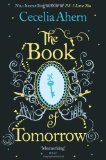

Cecelia Ahern – The Book of Tomorrow
The first Cecelia Ahern book I'd ever read – particularly drawn to this one as it has a pretty cover and is about a teenager rather than a proper grown-up. Tamara's father has just died, and she and her mother move to the country to live with her aunt and uncle, near the ruins of a castle. The take on Celtic Tiger Dublin is really well handled – in some ways I'd have loved to see this as a realistic teen novel rather than chick-lit with a magical twist. Tamara finds a book, a diary, that reveals what's going to happen the next day, but that device is less important than all the secrets lurking beneath the surface of the family and the castle. The ending felt like a little too much, pushing the bounds of plausibility even as far as the story's world was concerned, but until then it was an interesting read.
Maria Duffy – Any Dream Will Do
Very cool to see Maria Duffy's first book out so quickly! Jenny Breslin has Twitter friends on their way to stay with her – but she's never met any of them in real life before and is a little concerned how things might go. Rightly so, as it turns out – they've all got secrets of their own, things they haven't been 100% honest about on the internet. Fun, funny and fast-paced – a great holiday read.
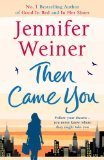

Jennifer Weiner – Then Came You
The story of a surrogate pregnancy as told from the points of view of the rich mother, the egg donor, the surrogate, and the half-sister. There's a rich backstory for everyone involved and it all comes together beautifully in the end. I've heard so many great things about Jennifer Weiner's books – will definitely be reading more of them after this one.
Leigh Fallon – Carrier of the Mark
Paranormal romance centred about an American girl who comes to live in Ireland. Picked up mostly for the setting – there are a couple of nifty scenes in Trinity, especially.
Jeff Kinney – Diary of a Wimpy Kid #6: Cabin Fever
Funny as ever. It's holiday season, and Greg's looking for a way to make money. Disaster inevitably ensues.
November 20, 2011
Eagerly anticipating in 2012…
Dystopian universes that come in trilogies
Promised – Caragh O'Brien
Insurgent – Veronica Roth
Pandemonium – Lauren Oliver
Contemporary, insightful YA
The Fault In Our Stars – John Green
Getting Over Garrett Delaney – Abby McDonald
The List – Siobhan Vivian
The Story of Us – Deb Caletti
Gone, Gone, Gone – Hannah Moskowitz
The Look – Sophia Bennett
Contemporary, insightful YA with supernatural elements
Eighteen Kisses – Laura Jane Cassidy
Shine – Jeri Smith-Ready
Team Human – Sarah Rees Brennan & Justine Larbalestier
High fantasy (this is a short list)
Bitterblue – Kristin Cashore
Science fiction murder mystery (also a short list)
A Million Suns – Beth Revis
Smart, funny chick-lit
Mercy Close – Marian Keyes
I've Got Your Number – Sophie Kinsella
The Shoestring Club – Sarah Webb
Nine Uses for an Ex-Boyfriend – sarra Manning
And I'm sure my bank balance will not thank me for asking this, but… anything else I should definitely be biting my nails in anticipation for?
November 13, 2011
Author Appreciation Post: Paula Danziger
(And time now for another Author Appreciation session…)
One of my very favourite books of all time is called This Place Has No Atmosphere by Paula Danziger, an American children's author who passed away a few years ago. Danziger wrote a whole lot of books, but this one is a particular favourite because it's a teenage angst story that is set on the moon. Aurora and her sister Starr have to leave Earth when her parents – a doctor and a dentist – decide to join the team going to the small colony on the moon. At school, Aurora's part of the popular, cool crowd – the Turnips – even though she feels like she doesn't really fit in. On the moon, there's hardly anyone her own age – and they are most definitely not the kind of people who'd fit in back home.
There are some parts that are silly. Like most of Danziger's books there are a lot of puns. I mean, a lot. But there are also nifty predictions into the future, some of which still seem semi-plausible twenty-five years after the book was originally published. The portrayal of how kids and teenagers behave, even in this futuristic world, is completely spot-on. And it's set on the moon! How cool is that?
Paula Danziger wrote other books that I've read over and over again. The Matthew Martin quartet is terrific, and The Cat Ate My Gymsuit – about an overweight girl who learns to stand up for herself when she gets a cool, untraditional (but also highly flawed) English teacher – taps into so many tropes that I adore. (Not to mention the fact that it has a sequel set in summer camp. Oh my.)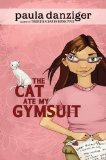

I still remember the rush of discovering that Danziger was friends with another childhood (and, well, adulthood) favourite of mine, Ann M Martin; when they collaborated on a book, P.S. Longer Letter Later, it was a happy day. (That book also has a sequel.)
I remember vividly parts of The Pistachio Prescription, in which Cassie deals with nerves by eating pistachios and becomes part of a campaign to shake up student government in her school. (And the eyebrows bit.) I remember Lauren and Zach from Can You Sue Your Parents for Malpractice?, and the big deal about a teenage girl dating a younger guy, and the difficulties with both her sisters, and the theme of injustice running throughout. Part of the reason I remember them is because I've reread them, of course. Like the very best childhood favourites, they hold up well.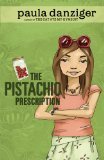

The way in which Danziger takes her characters seriously – gives them dysfunctional families to cope with and never swoops in with an unrealistically happy ending – and how she manages to write compassionately about the injustices of the world, especially for young people, while still being very funny, is wonderful. The adults are marvellously flawed – I love reading about the parents who can't manage their money, for example, and I still remember the way the Martins argue over which way the toilet roll hangs. It's an imperfect, messy, complicated world (or moon) but ultimately a hopeful one. With puns. What more could you ask for?
"I made the choice long ago to write about real life. And life is both serious and funny."
– Paula Danziger on writing about serious issues
November 6, 2011
History and Writers
Occasionally I am asked questions relating to what people 'should' study at college, especially if they want to be a writer. (Sometimes it comes in the form of 'do I have to study English?')
Well. I have discussed English degrees here previously, and the importance of studying what you love. But now I want to talk about… history.
Because if I had to pick one subject that I think helps or suits writers, it's that. And no one seems to ever talk about it.
I did not anticipate studying history at college, but then because of the way the joint honors degree programme was structured at Trinity, and because I wanted to do English without having to do Old English, I ended up in history. It seemed like a subject I could do with English that wouldn't destroy my soul.
Now, I suspect this is the case for most third-level subjects that also appear on second-level curricula, but people have a terrible tendency of thinking they know what you do in history. They seem to be under the impression it's about memorising dates. About learning off what happened.
Oh, the history student will say, shaking their head, if only we could be sure about what had happened!
Or if people could agree about what had happened. Or why it had happened. Or the significance of it happening. Or about the impact of it happening on people at the time.
So much of history is about people. Every university and department and lecturer will have their own preferences in terms of what they focus on, of course – do we care about 'the ordinary people' or 'the women' or do we even have the available sources to say much about them? Do we focus on what the parliamentary records say, what the newspapers reported, what someone scribbled in their diary, what a novel of the time implies? Do we focus on the economy or the architecture, on education, music, medicine, shopping? Or do we look at military tactics and who won which battle? It's possible to avoid people, but it gets less likely the more you look at a particular topic.
History invites us to empathise with the people of the past. To understand them. It asks: how did they see the world? It can be tempting sometimes to see the people of the past as simpletons – rather than people who had a different conceptualisation of things we may take for granted. History asks us to consider how a particular culture shapes people and shapes how they view things – how we view things. Our idea of what's 'normal' is very much a culturally specific thing rather an ahistorical unchanging 'truth'. History reminds us of that.*
An ability to empathise, to understand, and to speculate where necessary… a writer needs these skills, and studying history invites you to exercise and develop them.
Also… history is fun.
(any excuse…)
*As you may notice, I'm not advocating the study of history as a 'if we don't study the past how can we learn from it?' thing. I think it is patently obvious that what we learn from the past is that we don't learn from the past…
November 1, 2011
Links of interest from that world wide web yoke
–> Anna Carey writes about why adults are watching kids' comedy series, and why they are brilliant. My beloved Horrible Histories is mentioned. This pleases me immensely.
–> Gemma Malley, author of The Declaration trilogy, has a new YA dystopian trilogy kicking off in March 2012.
–> In other dystopian-YA news, follow Caragh O'Brien on her blog tour for her new book, Prized. (Loved it.)
–> Need something to counteract the bile of that dreadfully homophobic Indo article last weekend? Have a read of what Jennifer O'Connell or Ross Golden-Bannon have to say about homophobia in Ireland and beyond.
–> Megan Crane, author of smart chick-lit and swoony romance novels, writes about finding her voice for both these things.
–> YA author Aimée Carter talks about what it takes to write – courage.
–> For anyone who's read Veronica Roth's Divergent, her post about what changed from the first to final draft is very interesting, particularly for people who wonder what kind of changes 'revising' or 'editing' entails.
–> YA author Geraldine Meade talks about writing YA fiction over at writing.ie.
–> The web comic Hyperbole and a Half talks about depression. Quote:
October 28, 2011
Elsewheres (and a question)
I have talked – well, typed – about twitter and emails meant for other people over at The Anti-Room.
And over at the CBI blog I yammered about my book festival experience this year, at least the Cork bit of it.
Finally, I am over at Goodreads. To be honest, I don't do a whole lot over there – mostly my bookish thoughts can be found here – but I do like giving stars to things (it's also quicker than doing up thoughts!) and adding things to my to-read list (both new books and the I-should-really-should-have-read-this-by-now titles). For any of you who are very into the Goodreadiness – what's your favouritest part?
October 24, 2011
Some Nano-ish and deadline-ish thoughts
Nanowrimo kicks off shortly. For the uninitiated (if there are any left out there), the idea is that you write 50,000 words in a month. In November. It's a short novel, but it's doable in the 30 days that you have.
The idea is to stop being a 'one-day novelist' – as in, 'one day, I'll write a novel' and just do it.
Writers, both published and aiming-for-publication types, also use it as a way of structuring their writing time – it can be easier to keep motivated with a project when you know lots of other people are doing the same thing. (And the forums can be very useful for quick research questions.)
This post – the 25 things you should know about Nanowrimo – is well worth reading, though I don't necessarily agree with all of it. But I do like the idea of tweaking the Nano opportunity to get whatever you need to get out of it.
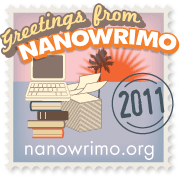 For me, there are definitely times when taking longer to write a first version of a novel results in a better first version. There's time to reread, and ponder, and consider, and revise earlier bits as you go along. But there's also time to get distracted, to shift the focus slightly, to become less passionately interested in the story and the characters. Sometimes the intensity of writing quickly and often can really help. The challenging part of Nano isn't writing 1,666 words in a day – for most writers it's a reasonable amount – but writing 1,666 words every day for a month (or however you're structuring your writing time) so that they add up to 50,000 by the end of it.
For me, there are definitely times when taking longer to write a first version of a novel results in a better first version. There's time to reread, and ponder, and consider, and revise earlier bits as you go along. But there's also time to get distracted, to shift the focus slightly, to become less passionately interested in the story and the characters. Sometimes the intensity of writing quickly and often can really help. The challenging part of Nano isn't writing 1,666 words in a day – for most writers it's a reasonable amount – but writing 1,666 words every day for a month (or however you're structuring your writing time) so that they add up to 50,000 by the end of it.
The ever-wise Alison Wells has written about finding the time for Nanowrimo. And Ellen Brickley, a ML for the Dublin region and Nano enthusiast, talks about reasons to do it.
November can be a busy month for some of us. I can write 50k in 30 days, but usually not in November. At the same time, the question is always are things genuinely busier-than-normal at the moment, or is my life always busier-than-normal? Because there are always so many stories you could tell – more than you can ever get down on the page – and you have to start somewhere. I think the great thing about anything like Nanowrimo is that it slaps down a starting point and a deadline and says, Right. Come on. Let's do this thing. Let's get it out of your head, and onto the page – let's stop dreaming and thinking and start doing – let's go, let's go, let's go.
October 19, 2011
Links from around the internets
–> There's a Guinness World Record attempt taking place next Wednesday (October 26th) in Dublin. The record in question is 'most people to write a story' – they need 900+ – and the organisation is See Change, who are aiming to reduce the stigma and silence around mental health in Ireland.
–> More on mental health: what the Irish presidential candidates would do about it.
–> Elizabeth Rose Murray did a write-up of the Irish PEN event for people writing for kids and teens over at writing.ie. Well worth reading.
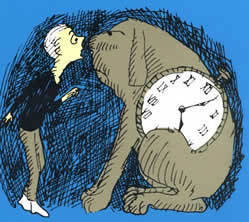 –> The Phantom Tollbooth turns 50 this year – and there's a very nifty documentary to mark the fact.
–> The Phantom Tollbooth turns 50 this year – and there's a very nifty documentary to mark the fact.
–> Over at Inis magazine, there's the question of should writers review books – and is it their 'duty' to?
–> William Shatner continues to be Shatneresque.
–> YA author Hannah Moskowitz talks about creating playlists for writing projects.
–> Over at The Plath Diaries, Maeve reflects on working in the Plath archives at Smith College. (Highly recommend her blog to anyone interested in academia, the agonies and ecstasies of postgraduate study, and Sylvia Plath.)
–> Sarah Rees Brennan talks about the internet and being a writer on the internet – things to think about.

